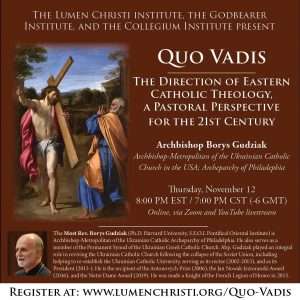
Tag: Byzantine Catholic Theology
Introducing the NEW “God With Us Online”
The Seventh Ecumenical Council
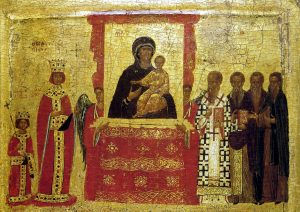 On this Sunday, we also remember the Nicea II Council in 787, which defined that we can make images (icons) of our Lord and the saints, and venerate them. This council was held in the midst of the iconoclastic (the “image breaking”) controversy, the first phase from 726-787, and the second phase from 814-842. It draws attention to how important images are for us. I know of few homes that do not have a picture, today usually a photograph but sometimes a portrait or drawing, of those we love.
On this Sunday, we also remember the Nicea II Council in 787, which defined that we can make images (icons) of our Lord and the saints, and venerate them. This council was held in the midst of the iconoclastic (the “image breaking”) controversy, the first phase from 726-787, and the second phase from 814-842. It draws attention to how important images are for us. I know of few homes that do not have a picture, today usually a photograph but sometimes a portrait or drawing, of those we love.
If we love Christ first with our whole heart and mind and soul, the image helps us to focus that love. We know these images are only paper or wood and ink or paint, but through the eyes of our body they make the person present in spirit. Yet some people hate images. There is a danger of idolatry, and the council did dialogue with those people who had that fear of idol-worship, and so defined clearly how images are to be venerated: “For the more they are contemplated, the more they move to fervent memory of their prototypes. Therefore, it is proper to accord to them a fervent and reverent adoration, not, however, the veritable worship which, according to our faith, belongs to the Divine Being alone — for the honor accorded to the image passes over to its prototype, and whoever adores the image adores in it the reality of what is there represented.” This is the Christian faith. We cannot make images of the divine nature, but the mystery of the incarnation, in which the Word of God became truly a human being, the two natures united in one person, allows us to make images of Jesus, who was like us in every way except sin. This leads us to a deeper mystery, that we are created in the image of God, and that “all of us, gazing with unveiled face on the glory of the Lord, are being transformed from glory to glory, as from the Lord who is the Spirit. (2 Corinthians 3:18)” And the glory and the wisdom of the Lord is his emptying, his love, his cross and his resurrection.
Meditation by Archpriest David Petras
Sunday of the First Ecumenical Council
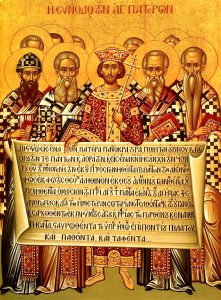 On this Sunday, we commemorate the First Ecumenical Council held in the year 325. This Council defined our faith in Christ, that he was truly God, who had been born of the Virgin Mary as a human being, therefore uniting God and us. The proclamation of faith that they composed is now read at every Divine Liturgy. It was completed in its present form at the Council of Constantinople in 381, with a fuller definition of the nature of the Holy Spirit. When the Creed is about to be read, the deacon intones, “Let us love one another, that with one mind we may profess: (we then recite the Creed).” In our faith, we profess the love of God for us, because he has come to be with us, and has sent the Spirit of truth in our hearts, to “ … guide you to all truth. (John 16:13)” The truth is this: that Jesus the Messiah is truly the Son of God, that he is our Redeemer, and that he has ascended into glory, but has not left us orphans, sending his Spirit into our hearts and minds and souls. Jesus told us, “I am the way and the truth and the life. (John 14:6)” If this is indeed the truth, then, as the deacon in the Liturgy says, we must profess it “in one mind.” We conclude the prayer of the Anaphora by saying, “Grant that with one voice and one heart we may glorify and praise your most honored and magnificent name, Father, Son and Holy Spirit.”
On this Sunday, we commemorate the First Ecumenical Council held in the year 325. This Council defined our faith in Christ, that he was truly God, who had been born of the Virgin Mary as a human being, therefore uniting God and us. The proclamation of faith that they composed is now read at every Divine Liturgy. It was completed in its present form at the Council of Constantinople in 381, with a fuller definition of the nature of the Holy Spirit. When the Creed is about to be read, the deacon intones, “Let us love one another, that with one mind we may profess: (we then recite the Creed).” In our faith, we profess the love of God for us, because he has come to be with us, and has sent the Spirit of truth in our hearts, to “ … guide you to all truth. (John 16:13)” The truth is this: that Jesus the Messiah is truly the Son of God, that he is our Redeemer, and that he has ascended into glory, but has not left us orphans, sending his Spirit into our hearts and minds and souls. Jesus told us, “I am the way and the truth and the life. (John 14:6)” If this is indeed the truth, then, as the deacon in the Liturgy says, we must profess it “in one mind.” We conclude the prayer of the Anaphora by saying, “Grant that with one voice and one heart we may glorify and praise your most honored and magnificent name, Father, Son and Holy Spirit.”
Today’s Gospel tells us that this is exactly how we are united to God, and become “partakers of the divine nature (2 Peter 1:4): “Holy Father, keep them in your name that you have given me, so that they may be one just as we are. (John 17:11)” There is no unity more perfect than the unity of the Trinity, and in our life of faith, we share in that unity. Throughout the history of the Church, there have been those who have erred either by saying that Jesus is not perfect man or by saying that he is not perfect God. We too often let our own self-righteousness dominate the transcendent truth of the faith. However, the deacon says one thing even more profound – this unity must proceed from love, for he says, “Let us love one another that we may profess … “ The world today seems to thrive on a rhetoric of hate rather than love, and the false ideas of the world can easily infect the Church. The feast today is directly opposed to hatred, it tells us that we can achieve the unity that God desires only through love, for “God is love. (1 John 4:8)”
Jesus
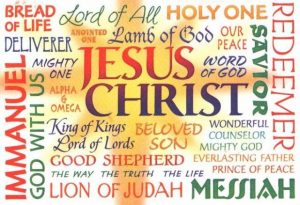 Today we celebrate the Incarnation of the Word, the birth of our divine Lord, Savior and Good Shepherd, Jesus the Christ. The Holy Name Jesus (Yashua, or some variation) in Hebrew means “God saves”: his name truly reflects his profound identity!
Today we celebrate the Incarnation of the Word, the birth of our divine Lord, Savior and Good Shepherd, Jesus the Christ. The Holy Name Jesus (Yashua, or some variation) in Hebrew means “God saves”: his name truly reflects his profound identity!
Honor the Lord’s holy name by not using it vain.
7th Ecumenical Council
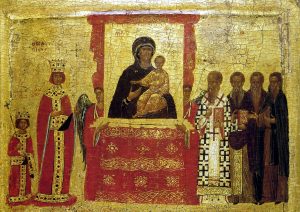 Meditation by Very Rev. Dr. David Petras
Meditation by Very Rev. Dr. David Petras
On this Sunday, we also remember the Nicea II Council in 787, which defined that we can make images (icons) of our Lord and the saints, and venerate them. This council was held in the midst of the iconoclastic (the “image breaking”) controversy, the first phase from 726-787, and the second phase from 814-842. It draws attention to how important images are for us. I know of few homes that do not have a picture, today usually a photograph but sometimes a portrait or drawing, of those we love. If we love Christ first with our whole heart and mind and soul, the image helps us to focus that love. We know these images are only paper or wood and ink or paint, but through the eyes of our body they make the person present in spirit. Yet some people hate images. There is a danger of idolatry, and the council did dialogue with those people who had that fear of idol-worship, and so defined clearly how images are to be venerated: “For the more they are contemplated, the more they move to fervent memory of their prototypes. Therefore, it is proper to accord to them a fervent and reverent adoration, not, however, the veritable worship which, according to our faith, belongs to the Divine Being alone — for the honor accorded to the image passes over to its prototype, and whoever adores the image adores in it the reality of what is there represented.” This is the Christian faith. We cannot make images of the divine nature, but the mystery of the incarnation, in which the Word of God became truly a human being, the two natures united in one person, allows us to make images of Jesus, who was like us in every way except sin. This leads us to a deeper mystery, that we are created in the image of God, and that “all of us, gazing with unveiled face on the glory of the Lord, are being transformed from glory to glory, as from the Lord who is the Spirit. (2 Corinthians 3:18)” And the glory and the wisdom of the Lord is his emptying, his love, his cross and his resurrection.
Byzantine Catholic theology explored
If you have ever been interested in the deeper questions of theology from the Byzantine perspective, or have had doubts about the teachings of the Church, perhaps a little study will help you clarify what the Byzantine Catholic Church holds and teaches and how she forms the hearts and minds of the faithful.
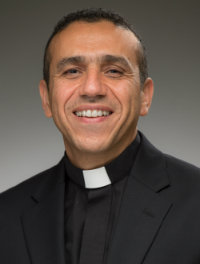 Father Khaled Anatolios, PhD of the University of Notre Dame’s Department of Theology is a married priest of the Melkite Eparchy of Newton. He explains his current work as a professor, researcher and writer in this brief video.
Father Khaled Anatolios, PhD of the University of Notre Dame’s Department of Theology is a married priest of the Melkite Eparchy of Newton. He explains his current work as a professor, researcher and writer in this brief video.
Father Anatolios is interested in all aspects of the theology of the early Church, with special emphasis on the Trinitarian and Christological doctrines of the Greek fathers and Augustine; early Christian biblical exegesis; and the engagement between early Christian theological reflection and contemporary theologians. His current research focuses on the doctrine of salvation, particularly the disconnect between classical sources and modern experience. “Christian teaching comes out of a history of interpretation, of conversation, of dialogue, of debate, sometimes of conflict,” Anatolios said. “To understand the contents of that revelation, we have to try to reinsert ourselves into that culture so that we can re-inhabit that world.”
You may be interested in listening to this talk of Father Anatolios on mystery and the Holy Trinity.